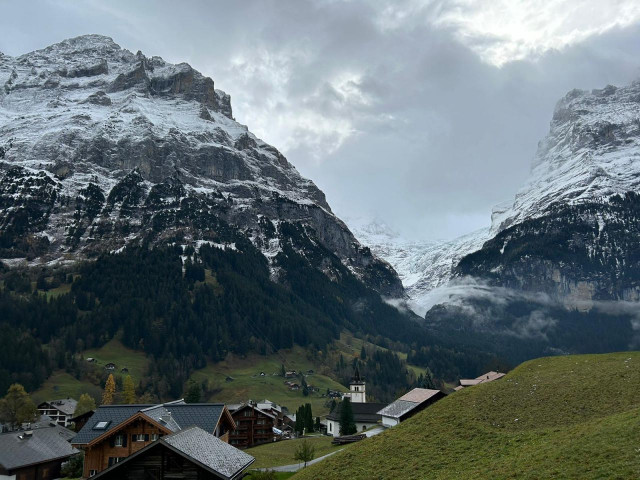Mountain Landscapes – Places of Relaxation and Awe
Written by Ilkim Aylin Aydin & Sina Krumhard, students of the University of Zurich
Wandering through the corners of the mountain village of Grindelwald and absorbing the scenic beauty brought me profound peace and fulfillment. The sight of the towering peaks, "Mättenberg" and "Eiger," left me captivated. Proximity to these majestic summits evoked a sense of awe, making me feel both small and astonished. Meandering through the natural landscape of the valley, with mountains enveloping from both sides, induced a deep sense of relaxation while taking in the peak's beauty. While wandering about, I wondered: Why is it that these mountains make me feel so calm and thoughtful?
I am not the only one who was mesmerized by this place. For centuries mountain peaks in Switzerland have attracted visitors with their impressive and powerful topography. The earliest touristic activities in Grindelwald can be traced back to the late 1600s and culminated in its first skiing season in 1888. Ever since then the village has become a widely loved recreational destination all year round (Gemeinde Grindelwald, 2020). But what makes mountains such a popular destination?
Results by White et al. (2013) suggest that spending time in nature is generally associated with high levels of restoration. The highest impact on restoration is achieved in mountainous and coastal areas or woodlands, with countryside environments having lower, but still relatively significant benefits. Interestingly, one can receive the positive effects of nature landscapes without even viewing it directly. Jo et al. (2022) found that even viewing mountainous environments on a large screen can positively affect one's mental and physiological well-being.
Ding et al. (2021) found that millennials appreciate natural landscapes and choose mountains as their travel destination because of their unique and aesthetic landscapes. One explanation, on why nature landscapes are relaxing, derives from the emerging possibility to reflect while spending time in nature. This is closely related to the findings of Løvoll et al. (2020), who examined well-being in relation to aesthetic experiences and environmental conditions in mountainous terrains. They argue that aesthetic experiences are more than just visually pleasing but also bring to the forefront what one values as important. In this sense, it is also about a self-aware reflection on oneself and one's surroundings (Bergmann & Eaton, 2011).
Experiences of beauty in nature are accompanied by more sublime effects of wonder, awe, and reflection (Løvoll et al., 2020). In their study, Løvoll et al. (2020) found that appreciation for beauty and aesthetic experiences in nature highly correlates with feeling at home in nature. Additionally, they could observe a strong connection between feeling at home in nature and positive emotions. Therefore, they suggest that positive emotions in nature foster a sense of belonging, creating safe and inspiring moments that, in turn, elicit more positive emotions. Being away from everyday stress and civilization and living with less effort all support one's psychological well-being (Løvoll et al., 2020).
In conclusion, the research underscores the timeless connection between nature's beauty and our well-being. It provides a possible explanation for why the quiet embrace of Grindelwald's mountains evoked in me not only awe and wonder, but also brought forth feelings of deep relaxation and thoughtfulness.
Literature:
Bergmann, S., & Eaton, H. (2011). "Awareness Matters," in Ecological Awareness: Exploring Religion, Ethics and Aesthetics, eds S. Bergmann, and H. Eaton (Münster: LiT Verlag), 1–7.
Ding, K., Yang, M., & Luo, S., (2021). Mountain Landscape Preferences of Millennials Based on Social Media Data: A Case Study on Western Sichuan. Land, 10(11), 1–17. https://doi.org/10.3390/land10111246
Gemeinde Grindelwald. (2020). Historisches - Einwohnergemeinde Grindelwald. Einwohnergemeinde Grindelwald. Retrieved from https://www.gemeindegrindelwald.ch/portrait/geschichte/.
Jo, H., Ikei, H., & Miyazaki, Y., (2022). Physiological and Psychological Benefits of Viewing an Autumn Foliage Mountain Landscape Image among Young Women. Forests. 13(9), 1–10. https://doi.org/10.3390/f13091492
Løvoll, H. S., Sæther, K. W., & Graves, M. (2020). Feeling at home in the wilderness: Environmental conditions, well-being and aesthetic experience. Frontiers in psychology, 11, 1–13.
White, M. P., Pahl, S., Ashbullby, K., Herbert, S., & Depledge, M. H. (2013). Feelings of restoration from recent nature visits. Journal of environmental psychology, 35, 40–51.
Related Posts
Comments
By accepting you will be accessing a service provided by a third-party external to https://www.mountainapp.net/
This website uses no external trackers, no analytics, just session cookies and values your online privacy.



